The Astrological Spread
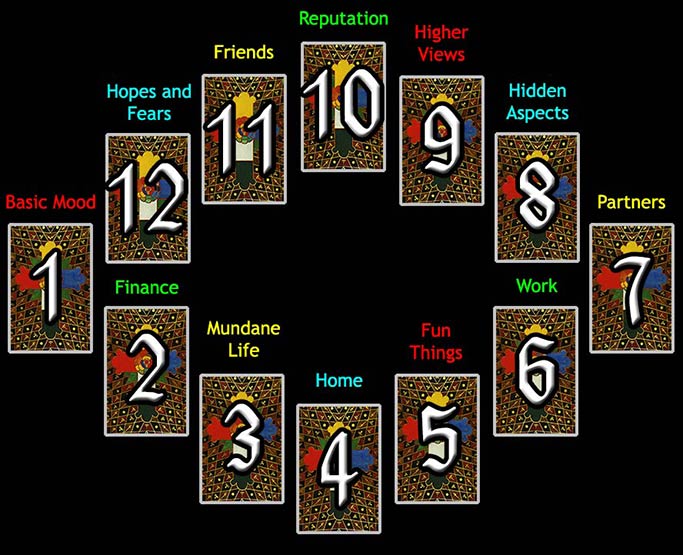
Difficulty: Complicated
The Astrological Tarot Spread is based upon houses of astrology. This complicated spread takes several steps to understand.
The first step is to interpret the tarot card for each individual position in the spread.
The second step involves further examination of the main axes. Positions 1 & 7 show the relationship theme, #1 representing the reader, #7 their partner. Positions 4 & 10 indicate motion. #4 indicates where the reader is now, and #10 suggests what they are moving towards.
The third step involves breaking down the chart into triads according to their house elements.
Positions 1, 5, & 9 represent the Fire triad, symbolising temperament and personal development.
Positions 2, 6, & 10 represent the Earth triad, concerned with materialism, money, and work.
Positions 3, 7, & 11 represent the Air triad, which has to do with thoughts, ideas, and connections with other people.
Positions 4, 8, & 12 represent the Water triad, the realm of emotions, moods, intuition, and yearnings.
Further, other patterns and correlations between certain numbers can be noted. Certain numbers such as the set of 5, 7, & 8 often speak about a particular theme.
Your Astrological Tarot Reading with the Book of Thoth
| 10 | ||||||
| 11 |  |
9 | ||||
| 12 | 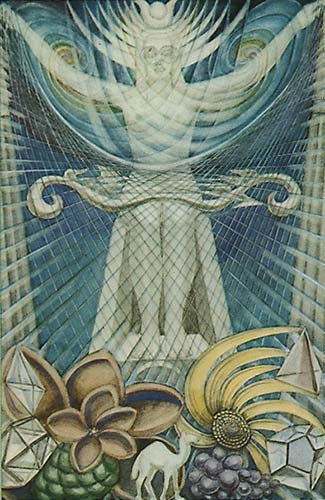 |
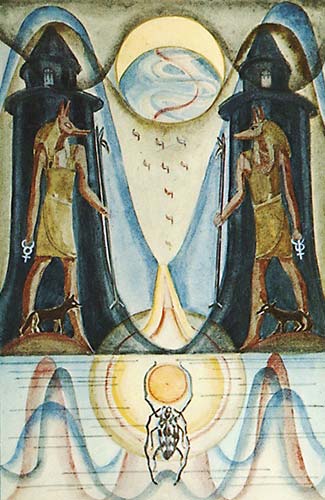 |
8 | |||
| 1 | 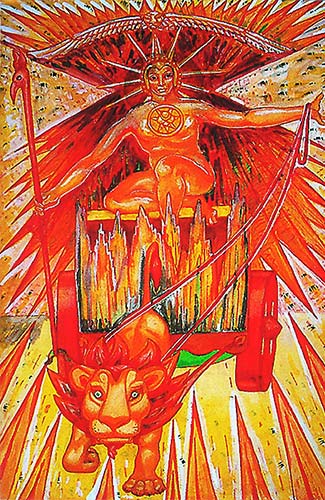 |
 |
7 | |||
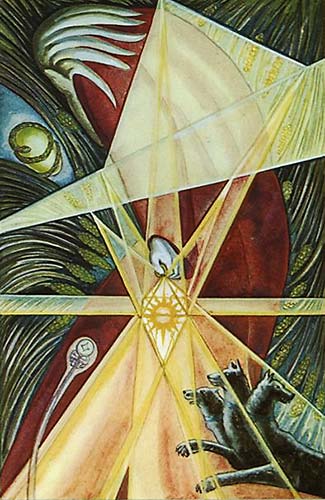 |
2 | 6 | 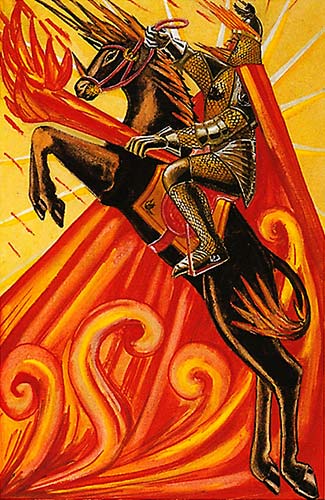 |
|||
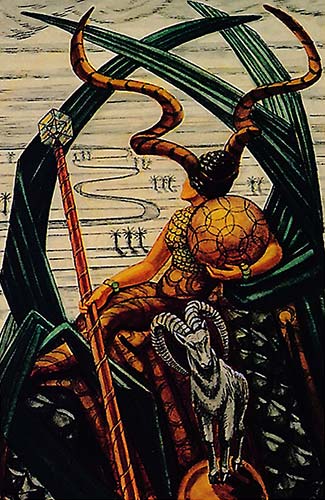 |
3 | 5 | 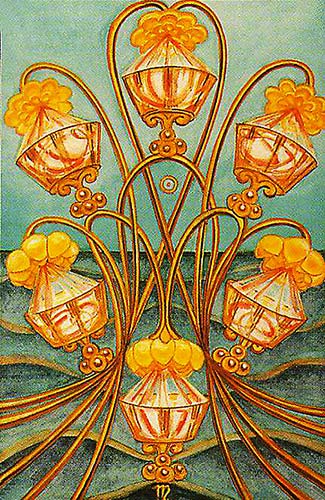 |
|||
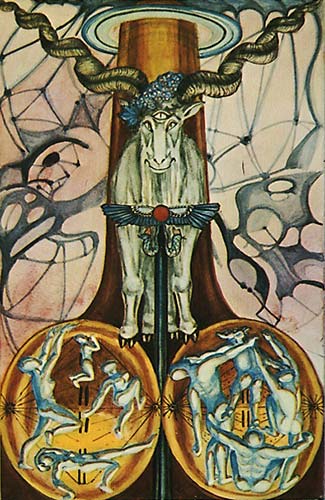 |
4 | 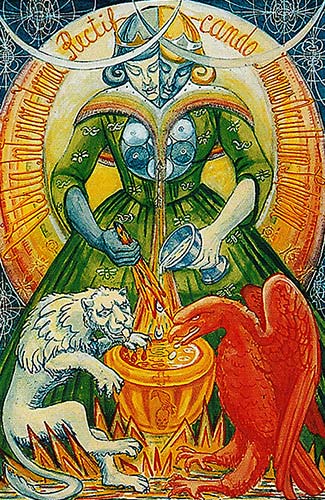 |
||||
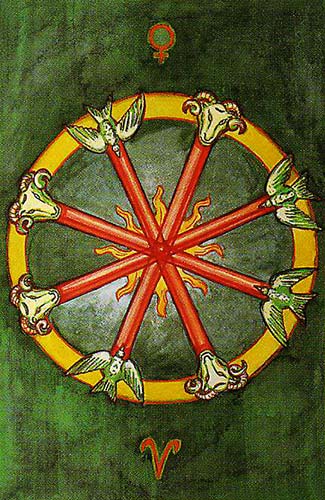 |
1: Basic Mood

Virgo
Illumination from within, secret impulse from within; practical plans derived accordingly. Retirement from participation in current events.
2: Finance

Capricorn
The Queen of Disks represents the watery part of Earth, the function of that element as Mother. She represents passivity, usually in its highest aspect. The Queen of Disks is throned upon the life of vegetation. She contemplates the background, where a calm river winds through a sandy desert to bring to it fertility. Oases are beginning to shew themselves amid the wastes. Before her stands a goat upon a sphere. There is here a reference to the dogma that the Great Work is fertility. She thus represents the ambition of matter to take part in the great work of Creation.
Persons signified by this card possess the finest of the quieter qualities. They are ambitious, but only in useful directions. They possess immense funds of affection, kindness, and greatness of heart. They are not intellectual, and not particularly intelligent; but instinct and intuition are more than adequate for their needs. These people are quiet, hard-working, practical, sensible, domesticated, often (in a reticent and unassuming fashion) lustful and even debauched. They are inclined to the abuse of alcohol and of drugs. It is as if they could only realise their essential happiness by getting outside themselves.
3: Mundane Life

Capricorn
Blind impulse, irresistibly strong and unscrupulous, ambition, temptation, obsession, secret plan about to be executed; hard work, obstinacy, rigidity, aching discontent, endurance.
4: Home

Venus in Aries – Completion
This card refers to Chesed in the suit of Fire. Being below the Abyss, it is the Lord of all manifested active Power. The original Will of the Two has been transmitted through the Three, and is now built up into a solid system: Order, Law, Government. It is also referred to Venus in Aries, which indicates that one cannot establish one's work without tact and gentleness. The wands are headed by the Ram, sacred to Chesed, the Father-god Amoun-Ra, as also to Aries; but at the other end of the wands are the Doves of Venus.
In the symbol, the ends of the wands touch a circle, showing the completion and limitation of the original work. It is within this circle that the flames (four double, as if to assert the balance) of the Energy are seen to play, and there is no intention to increase the scope of the original Will.
5: Fun Things

Sagittarius
Combination of forces, realisation, action based on accurate calculation; the way of escape, success after elaborate manoeuvres.
6: Work

Sun in Scorpio – Pleasure
This card shows the influence of the number Six, Tiphareth, in the suit of Water. This influence is fortified by that of the Sun, who also represents the Six. The whole image is that of the influence of the Sun on Water.
The lotus stems are grouped in an elaborate dancing movement. From their blossoms water gushes into the Cups, but they are not yet full to overflowing, as they are in the corresponding card below; the Nine. Pleasure, in the title of this card, must be understood in its highest sense: it implies well-being, harmony of natural forces without effort or strain, ease, satisfaction. Foreign to the idea of the card is the gratification of natural or artificial desires. Yet it does represent emphatically the fulfilment of the sexual Will, as shown by the ruling Sephira, planet, element, and sign.
7: Partners

Sagittarius
The Knight of Wands represents the fiery part of Fire. He is a warrior in complete armour. On his helmet for a crest, he wears a black horse. In his hand he bears a flaming torch; a flame also in his mantle; and upon the flames does he ride. His steed is a black horse leaping.
The moral qualities appropriate to this figure are activity, generosity, fierceness, impetuosity, pride, impulsiveness, swiftness in unpredictable actions. If wrongly energised, he is evil-minded, cruel, bigoted and brutal. He is in either case ill-fitted to carry on his action; he has no means of modifying it according to circumstances. If he fails in his first effort, he has no recourse.
8: Hidden Aspects

Virgo
The Knight of Disks represents the fiery part of Earth, and refers in particular to the phenomena of mountains, earthquakes, and gravitation; but it also represents the activity of Earth regarded as the producer of Life. This warrior is short and sturdy in type. He rides through the fertile land; even the distant hills are cultivated fields.
Those whom he symbolises tend to be dull, heavy and pre-occupied with material things. They are laborious and patient, but would have little intellectual grasp even of matters which concern them most closely. Their success in these is due to instinct, to imitation of Nature. They lack initiative; their fire is the smouldering fire of the process of growth.
9: Higher Views

Pisces
Illusion, deception, bewilderment, hysteria, even madness, dreaminess, falsehood, error, crisis, 'the darkest hour before the dawn', the brink of important change.
10: Reputation

Mercury
Skill, wisdom, adroitness, elasticity, craft, cunning, deceit, theft. Sometimes occult wisdom or power, sometimes a quick impulse, a brain-wave. It may imply messages, business transactions, the interference of learning or intelligence with the matter in hand.
11: Friends

The Moon
Pure, exalted and gracious influence enters the matter. Hence, change, alternation, increase and decrease, fluctuation. There is, however, a liability to be led away by enthusiasm; one may become 'moon-struck' unless careful balance is maintained.
12: Hopes and Fears

Leo
The moral qualities appropriate to this figure are swiftness and strength. But he is sometimes inclined to act on impulse; sometimes easily led by external influences; sometimes, especially in trifles, a prey to indecision. He is often violent, especially in the expression of an opinion, but he does not necessarily hold the opinion about which he is so emphatic. He states a vigorous proposition for the sake of stating it. He is in fact very slow to make up his mind thoroughly on any subject, but always sees both sides of every question. He is essentially just, but always feels that justice is not to be attained in the intellectual world. His character is intensely noble and generous.
He may be an extravagant boaster, while slyly laughing both at the object of his boast and at himself for making it. One of his greatest faults is pride; meanness and pettiness of any kind he holds in infinite scorn. His courage is fanatically strong, and his endurance indefatigable. He is always fighting against odds, and always wins in the long – the very long-run. This is principally due to his enormous capacity for work, which he exercises for its own sake, 'without lust of result'.
